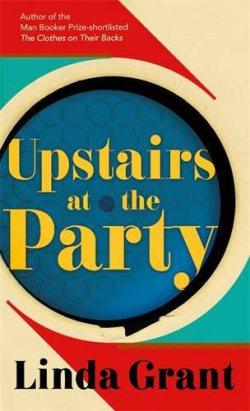 Linda Grant is one of the UK’s leading literary novelists and writers of non-fiction. She has been awarded many prizes including the Orange Prize for her second novel When I Lived in Modern Times, 2000. As I’ve mentioned before, her novel The Clothes on their Backs, short-listed for the 2008 Booker Prize, was the book which inspired me to start writing and I will always be very grateful for that. You can imagine how delighted I am that Linda accepted my invitation to the Literary Sofa to talk about her sixth novel Upstairs at the Party. It’s one of my Summer Reads 2014 (my mini-review follows):
Linda Grant is one of the UK’s leading literary novelists and writers of non-fiction. She has been awarded many prizes including the Orange Prize for her second novel When I Lived in Modern Times, 2000. As I’ve mentioned before, her novel The Clothes on their Backs, short-listed for the 2008 Booker Prize, was the book which inspired me to start writing and I will always be very grateful for that. You can imagine how delighted I am that Linda accepted my invitation to the Literary Sofa to talk about her sixth novel Upstairs at the Party. It’s one of my Summer Reads 2014 (my mini-review follows):
When I left university in 1975 my friends and I all felt that we had been expelled from an enchanted castle, or, like baby koalas, we were evicted onto an Antarctic ice floe. We had spent three years not amongst the dreaming spires of an ancient seat of learning but a windy, concrete campus built a few years earlier and arranged around the largest plastic bottomed lake in Europe. We were isolated in our Yorkshire stronghold, and prey to all kinds of unfeasible revolutionary ideas while unremarked on by us, the real revolution was taking place in the single-storey beige concrete building which housed the university computer, a ceiling-high Dr Who type contraption of dials and levers, tended by maths students in white lab coats.
We were early, prototype feminists for whom the publication of Germaine Greer’s The Female Eunuch had been an awakening to our teenage selves. Feminism hadn’t yet become a dirty word, it was barely a known word at all. We made it all up as we went along. We shared secrets about sex and sexuality. We thought it was okay to leave the house without a full-face of make-up. We were bolshie, we challenged our lecturers.
Returning to the university for the first time in nearly forty years, to receive an honorary doctorate, I felt that I had managed to pierce a membrane into the past, a distant, completely lost era. The place felt like Brigadoon, coming alive once a century then closing up again behind you. We all carry these personal pasts inside us, we are always struggling with the accretion of selves that have built up our known personalities. And how to explain them? How to tell another that our complicated mix of contradictions, insecurities and beliefs are based on snatches of former lives?
There are people we leave behind us, in the past. Friends we lose touch with or grow out of, or die young. The dead don’t necessarily lie cold in and forgotten in their graves but go on being a presence. I wrote this novel, Upstairs at the Party, out of a sense of wanting very much to penetrate the deep past of myself and others. I did not want it to be a depressing novel, I wanted to make fun of our over-seriousness, how ridiculous we must have looked, strutting around with our hennaed hair, our platform boots and primary-coloured Dutch clogs, our Biba purple-lipsticked mouths and our dresses wafting the mixed odour of patchouli oil and cigarette ash.

Novelists are always being asked, is it autobiographical? Yes, perhaps, but not in the way you think. Literature comes from the deep place, not the this happened, this didn’t happen. Yes, I hitchhiked across America, no, I didn’t ever work for a literary magazine. But I cannot rid myself of those memories of a strange time, a time cemented over, unknown. Mysterious and wild.
Thank you very much to Linda for this beautiful piece which made me want to read the novel again.
IN BRIEF: My View of Upstairs at the Party
The question of how we become who we are is central to this novel but applies to most fiction in varying degrees. Bringing abstract ideas such as memory, identity and belonging to life is a consistent strength of Linda Grant’s work and like her previous novels, Upstairs at the Party is intellectually and emotionally stimulating whilst at the same time highly compelling and accessible. The reader gets a vivid feel of the early seventies and this book will appeal to lovers of the campus novel although in both time and scope it reaches far beyond. That period feels so distant and yet many of the doubts and dilemmas faced by Adele and her contemporaries are still relevant today. There is a cast of complex and intriguing characters and it was fascinating to watch their lives unfold, forever changed by the events of one night. Linda Grant has long proven that it is possible, albeit rare at this level, to deliver story, character and extraordinary writing. Her prose draws deeply on the richness and beauty of the English language. A thought-provoking, enjoyable novel which doubles as literary inspiration.
*POSTSCRIPT*
Firstly, there was a fantastic response to last week’s rejected post about Coping with Rejection and I was happy that it sparked such a supportive and postive conversation between writers. Thank you to all who read, shared and took part.
Next week American debut author Laura McBride joins me with a Writers on Location post about setting a novel in her home town of Las Vegas. It’s another of my Summer Reads and has just been announced as a Radio 2 Book Club choice.

